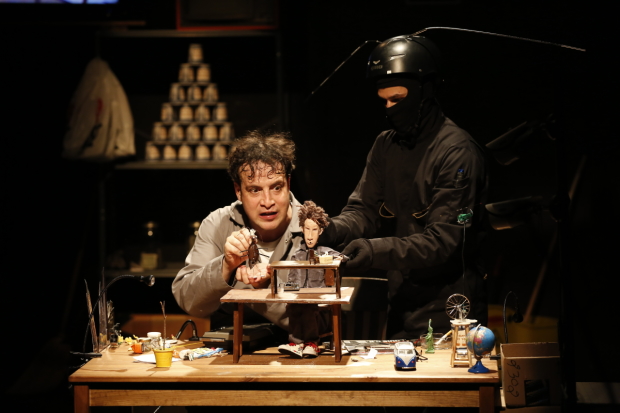The Duchamp Syndrome

(© Carol Rosegg)
We tend to like our immigrant stories straightforward in this country: It's either rags-to-riches Andrew Carnegie or unmitigated exploitation by the cruel capitalist machine. Few have the temerity to admit that for the vast majority of immigrants to this country, the truth actually lies somewhere in between. Mexican writer-performer Antonio Vega is one of those few. His new show, The Duchamp Syndrome, is now making its U.S. premiere with The Play Company at The Flea Theater. It overflows with humor and theatricality, all while remaining an unflinchingly honest account of one man's lonely experience in the Big Apple.
The Duchamp Syndrome marks the return of Vega, director Ana Graham, and their company Por Piedad Teatro. They last appeared in New York in Working on a Special Day, which was also a co-presentation with PlayCo, and featured the two artists playing every role. Vega and Graham again co-direct, but this time onstage it's only Vega and his shadow.
The story revolves around Juan, a Mexican immigrant who dreams of being a standup comedian. Between his two jobs (as a janitor and night watchman), he refines his routine with the help of his comedy mentor: a foul-mouthed cockroach (yes, an actual insect) named Tony Roach. Juan has trouble making human friends in New York City (with the exception of a Chinese junk collector named Whoo), so he uses a variety of found objects to invent his own, rivaling the cast of Friends. But if his life is not nearly as glamorous as that of the denizens of Central Perk, he's not letting his mother back in Mexico know. That is, until she arrives for a visit (in the form of a brave audience volunteer).
While it sounds like some rare disease, The Duchamp Syndrome is actually a reference to French sculptor Marcel Duchamp, who scandalized the art world of 1917 by submitting a manufactured porcelain urinal to a major exhibition. He titled the work "Fountain." "Anyone can be an artist if he or she wants to be," Juan decides after viewing Duchamp's "Bicycle Wheel" at MoMa, "One just need to complete the assimilation of two or more useful objects in such a way that said assimilation strips all involved objects of their usefulness."
In some ways Vega is like Duchamp, repurposing everyday objects into art. But rather than stripping them of their usefulness, Vega astounds us with his ability to find new uses. An old turntable becomes a comedy club for Tony Roach. The "Duchamp Applause Machine" (a replica of "Bicycle Wheel" modified with plastic hand clappers) fabricates an ovation for Juan as he performs his standup in solitude. Little plastic characters and puppets dance across Juan's wooden desk, some progressively shrinking to an impossibly tiny scale. The show even incorporates robotics: An iRobot Roomba becomes a central character and one of the many versions of Tony Roach is controlled by running a stylus across a handheld device.
Wearing stage blacks and a balaclava, Omen Sade is indispensible in the execution of this small-scale spectacle. He performs the part of The Shadow, a useful stagehand very similar to a kuroko in Kabuki. He deftly operates the camera that feeds live video to the flat screen mounted on the upstage wall so we can see closeups of Vega's puppets. With ninja-like reflexes he acts as a second pair of hands when Vega is juggling his occasionally complicated setups.
The show sometimes feels unfocused, with Vega leaping from scene to scene like a hyperactive five-year-old. "American Beauty," he shouts and dances as Sade points an electric fan at a billowing plastic "I ♥ NY" bag. This schtick has the potential to become quite irritating with a less sympathetic performer. It never does with Vega. One suspects that muscular editing from director Graham has a lot to do with this, but it also cannot be denied that Vega is naturally very funny.
Sure, he traffics in some of the worn clichés of solo performance, opening the show with janitorial stage business and engaging in some slightly awkward audience conscription. The Duchamp Syndrome is not so impressive for introducing new methods to the stage, but for liberally borrowing from various traditions and using them in rigorous and effective ways. A lighthearted humor pervades throughout, making it impossible not to laugh along with Vega as he guides us through Juan's bittersweet story. Like most immigrant tales, it's full of discovery and disappointment, hope and despair, conditions that awkwardly bump up against one another like commuters on a crowded train.











